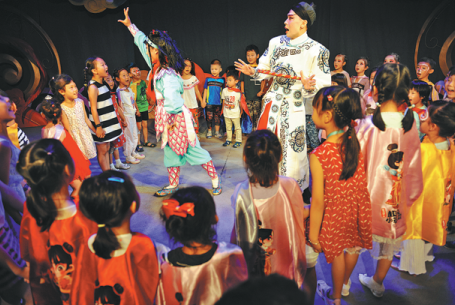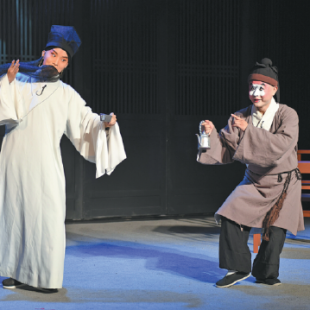Chinese operas in tune with the youth
Younger generation finds that ancient art forms still resonate with their daily concerns and they appreciate them more in smaller theaters, Chen Nan reports.

 Peking Opera performers interact with children at a workshop of the traditional art form at the Star Theater in Beijing during the summer vacation in 2019. CHINA DAILY
Peking Opera performers interact with children at a workshop of the traditional art form at the Star Theater in Beijing during the summer vacation in 2019. CHINA DAILY
Lessons from a poet
A 90-minute Peking Opera production, titled A Straw-Cloaked Life in Mist and Rain, opened the festival with two shows on Oct 21 and 22.The play, about Chinese poet Su Shi (1037-1101), also named Su Dongpo, of the Song Dynasty (960-1279), is directed by Bai Ailian from the Jingju Theater Company of Beijing.
"There are no Peking Opera scripts about Su Dongpo and the poet has never been portrayed by this art form. I wanted to give it a try," says Bai, who was born and raised in the Tibet autonomous region, and graduated in literary-and-arts-program directing from the Communication University of China.
Born into a family of scholars, Su Shi became famous at the tender age of 19, when he and his younger brother both scored exceptionally well in the imperial exam for aspiring government officials. Apart from that, Su also won further fame and admiration for his poetry, essays and calligraphy. Due to political conflict between various groups, Su was later banished from the royal court to Huangzhou, now Huanggang in Hubei province, where he was assigned a lowly government post. But his life in exile was not wasted, as he drew inspiration from the area and created some of his most famous artistic works.
According to Bai, one of the best parts of staging Peking Opera performances at small theaters is that "the small space allows directors, scriptwriters and actors to experiment with ideas that may not be suitable for big theaters".
There are some fictional scenes in the play, such as one where Su meets both an older and a younger version of himself in a dream. And Bai also has an actor playing the role of a narrator telling stories of Su, which helps the audience to better follow the play.
"I want to show how Su goes through struggles in his life and how he deals with them, which may resonate with today's audiences," the director says. The cast of the play includes veteran Peking Opera actor Jiao Jingge, a teacher at the National Academy of Chinese Theatre Arts, and his students, including Chen Zhe, Zhao Jia and Dong Jianhua.
Younger audience members relish such inspiring performances in small theaters. One of them, Ling Xiaomin, who watched the opening performance of the play about Su on the opening night of the Xiqu Opera Black Box Festival on Oct 21, says he prefers to watch performances in small locations.
Ling says: "I can still recall the first time that I watched a traditional Chinese opera performance at a small theater a year ago. The audience was sat so close to the stage that I could even hear the actors breathing." That play was A Commander's Introspection, he recalls, performed by actors of Northern Kunqu Opera Theatre, directed and co-written by young artist Hu Hanchi, and was based on a Chinese idiom, fanqiu zhuji, referring to self-reflection and trying to find fault in oneself rather than blaming others.
"Peking Opera shows in small theaters are rooted deeply in the old art form, but the way the stories are told are quite different and interesting to me," Ling says. Lower ticket prices are also appealing, he adds.
Other highlights of this year's festival include Lady Macbeth, a tale centered around one of Shakespeare's most infamous female characters by a Dianju Opera troupe from Yuxi, Yunnan province; Two Belles in Love, a Kunqu Opera work by the Northern Kunqu Opera Theatre; and a one-man show Chu Yun by China Pingju Opera Troupe, which combines Pingju Opera, physical theater and puppets.
Contact the writer at chennan@chinadaily.com.cn





































